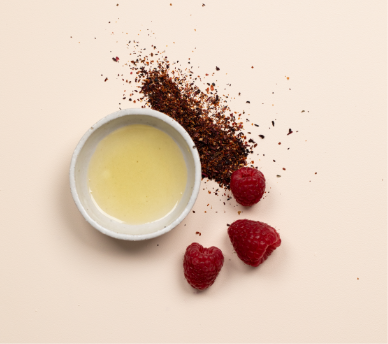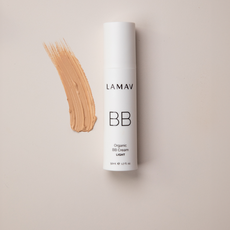As our body’s largest organ, our skin can not only tell us a lot about the state of our complexion—but our overall health and wellbeing, too. It is a great indicator for what’s going on inside our body and is also often the first place to show signs of a less than balanced diet, poor lifestyle practices, gut health issues, allergies or intolerances and the effects of environmental stressors.
As our skin is responsible for protecting us from our harsh environment, infections and pathogenic bacteria, regulating and eliminating water and fat-soluble substances through sweat and sebum; It’s no wonder that sometimes our skin can behave in somewhat erratic ways and look less than glowing.

Today we’ll explore what your oily and combination skin is trying to tell you—and give you some real, tangible and holistic solutions on how to care for it, combat excess oiliness without ripping off natural face oils and reveal your natural, inherent (shine-free!) beauty.
Oily/Combination Skin 101
When shopping for skincare, are you confused when asked to filter products by skin type or skin concern? If the answer is yes, rest assured you’re not alone! oily skin is characterised by excess oil and an over-secretion of sebum. While the production of sebum is a natural and important process—responsible for keeping our skin well-hydrated and protected—when this action goes into overdrive, it can wreak havoc on our complexion, leaving us looking shiny, feeling greasy, and prone to blocked pores, congestion, breakouts and even acne. Oily skin types often have larger, more visible pores and it can prove tricky to manage.
Combination skin, on the other hand, doesn’t really know how to make its mind up and can be dry, oily or a combination of both. Unlike true oily skin which is often slick all over—combination skin is typically characterised by skin that looks oily across the T-zone, but is drier across the cheeks. Your pores can also vary in size across each zone of your face—with your nose pores appearing larger than those on your cheeks.
Factors that Impact Oily or Combination Skin
As we already know, our skin can be influenced by both internal and external factors—some of which are out of our control. But when it comes to oily or combination skin, there are some clear culprits that can negatively affect the state of your skin and trigger excess oiliness.
-
An Imbalanced Diet
Our skin is a manifestation of our inner health and an imbalance in our Doshas (or energies) can also trigger an imbalance in our skin. Excess sugar, refined carbohydrates and processed foods have all been linked to skin inflammation and correlated with acne —as has an imbalance in the ratio between omega-6 and omega-3 fatty acids. In our modern Western diet, we consume an excess of inflammatory omega-6s and are often deficient in omega-3s —which can trigger a cascade of pro-inflammatory processes in the body, and subsequently impact our skin.
-
Hormonal Imbalances
Although hormone fluctuations such as those experienced during our menstrual cycle can trigger oily or congested skin—as well as acne—it’s not just an increase or sensitivity to a hormone like testosterone that can drive hormonal imbalances. Cortisol, our stress hormone, also directly impacts our skin by compromising our immune system and disrupting the microbial balance of bacteria in our gut. It also stimulates the production of sebum—leading to oily and congested skin—as well as skin inflammation such as acne
-
The Wrong Skincare
It sounds simple, but using skincare that’s not suitable for your skin type can actually exacerbate any existing skin concerns and cause your skin to become oilier or contribute to combination skin issues. As the skin struggles to rebalance itself, it can activate sebaceous activity, resulting in oiliness and clogged pores
Caring for Oily or Combination Skin
No matter your skin type, it’s essential to take a holistic approach to your health, beauty and wellbeing—embracing both diet and lifestyle practices that support your goal for clearer, more resilient skin
-
Develop a consistent daily skincare ritual
To combat oily and/or combination skin, it’s essential to develop a daily skincare ritual that helps to minimise excess oil production while also balancing your skin’s delicate microbiome. it can be tempting to over cleanse and scrub your skin in an attempt to remove oil, this method can have the opposite—and detrimental—effect of causing even more oiliness. Instead use a gentle skincare routine that incorporates nourishing bio-active ingredients that target excess oil production and rebalances the skin. Ingredients that are particularly effective for oily and combination skin types include:
- AHA Fruit Acids
- Probiotics
- Argan Oil
- Vitamin C
- Vitamin A
- Drink More Water
We all know we should be drinking at least eight glasses of filtered water a day—but aside from keeping our bodies well-hydrated, water plays an essential role in maintaining both superficial and deep hydration of the skin. This is equally important for oily and combination skin types which can both be triggered by dehydration. Similarly, studies have shown that those with acne-prone skin also benefit from remaining well-hydrated as dehydrated skin is an underlying factor in acne pathogenesis.
-
Focus On Your Inner Health
While topical skincare plays an important role in supporting your skin’s health, our complexion is actually a great indicator for what’s going on in our gut. In fact, the two engage in a constant dialogue via the gut-skin axis. This bidirectional pathway has also been well-studied, with research indicating that inflammatory skin conditions—such as acne—often manifest due to an imbalance in our microbiome. As such, one of the most important ways to support our skin health and combat any skin concerns such as oiliness, is to turn our attention inwards and focus on a nutrient-dense diet that supports optimal gut health. Some of the best nutrients to include are:
- Antioxidants
- Fibre-rich plant foods
- Minerals
- Probiotics and fermented foods
Fight Oily/Combination Skin with LAMAV
To properly nourish your oily, combination or acne-prone skin, we’ve created the ultimate LAMAV daily skincare ritual for you to try at home. Each product has been specifically formulated to nurture your skin on a cellular level to rebalance, brighten and reveal your glowiest skin yet! Here are some of our best organic skin care in Australia
- Sweet Orange Balancing Cleanser: Purify, balance and brighten your skin with this balancing cleanser. This cleanser helps balance sebaceous activity without depleting skin of its natural oils and also improves skin texture and treats imperfections.
- Marula Oil Cleanser: A purifying blend of natural and skin nourishing oils that cleanses the skin and gently dissolves makeup and impurities to reveal clear, radiant complexion. One of the best oil cleanser, the nourishing, antioxidant-rich formula enhances skin’s natural repair and keeps the lipid barrier intact, restoring moisture balance and healthy glow.
- Beauty Restore: A delicious natural berry-flavoured probiotic inner beauty elixir to restore gut health and strengthen digestive wellbeing for clearer, brighter, more resilient skin. Our synergistic blend of probiotics derives from bio-fermented papaya and encourages microbial balance.
- Commiphora Plumping Serum: A potent collagen-boosting serum that helps to reduce and prevent the appearance of fine lines and wrinkles. Paracress Extract, Commiphora and Wakame gently relaxes skin to appear plumper and youthful looking. Delivers visible age-defying results.
Conclusion
The most important aspect in any skin and wellbeing routine is consistency. Depending on your gut or skin imbalance it can take time to repair and see results. The good news is , you can treat your concerns and transform your skin by feeding it the right nutrients (both internally and externally) and developing a daily skincare ritual that targets your primary concerns and nourishes your skin on a cellular level. Be patient and kind to your skin.
Read more about our solutions for oily/combination skin for a flawless and glowing skin.











